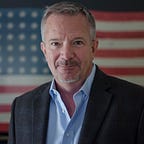Sitting with the Enemy
Who is your enemy? Many Americans today can answer that question without hesitation. It is the person next door whose yard sign supported the other political candidate. Maybe the colleague who has a different view of anti-COVID measures. It’s people on social media posting beliefs or calls to action we do not support. It does not take long to name an enemy close by today. Worse still, though, we are no longer shocked by calls for public violence, even death to those with whom we disagree. Is it any wonder, then, that we see daily scenes of violence across America?
We might rightly conclude that the rifts that run across our nation are on the way to becoming chasms that could divide us irreparably. Why does it seem we can no longer express opposing views or even acknowledge that some of our neighbors and friends believe differently than we? Must our first response to someone exercising their First Amendment Right be to vilify that person?
Hate is easy to express when you can scream, gesticulate, threaten, and spit in the face of someone who, in almost all cases, is not going to retaliate. It is even safer for those who sit at keyboards, posturing with sentences filled with action verbs and vile language, describing what they would do to enemies if only given a chance. When I hear the vitriol in how many Americans talk about their so-called enemies on television and on social media, I pause to think how few of them have ever killed or tried to kill real enemies. By enemy here, I mean people who also happen to be trying to kill you.
I once sat across from a Taliban commander I’d fought against in Operation Anaconda a few years before. Previously, I had read about Vietnam veterans who travel back to Vietnam years later and gain solace in meeting former enemies and forgiving each other. My case with the Taliban was perhaps a little different; he was still an enemy, and I needed to find a way to either gain his cooperation or put him in a position to be killed or captured. I was not trying to reconcile the past; instead, I needed to accomplish a tactical goal.
During our meeting, the Taliban commander complained to me that in the 1980s, we had worked together to fight against the Soviets; the U.S. then abandoned the Taliban after the Russians left Afghanistan. Finally, we attacked them in 2001. I explained to him that U.S. foreign policy shifts with different presidents and as our needs change. No excuses. That is just how it is with America. Then I reminded him that the Taliban hosted and allowed al-Qa’ida to attack the U.S. in 2001. The people of America then demanded we retaliate and take measures to reduce the chance it could happen again. No blame, it was just how things were.
During this meeting, I relied on my best imitation of the character played by Clint Eastwood in The Outlaw Josey Wales. In a pivotal scene, Josey meets with his enemy, the Indian warrior, Ten Bears. Jose does not propose to become his friend or to help him. Instead, he offers a choice: each can pursue his own life and separate ways while allowing the other to live, or they can continue to fight and kill one another. I made the Taliban commander a similar offer. In the end, he made the same decision as Ten Bears, to choose life.
We can see it is possible to acknowledge differences as vast as those between combatant enemies and still find a way forward. Why then can we not reintroduce civility and accept differences of opinion and beliefs among our fellow citizens? We have become too insular. We mistake bold internet posts as adequate substitutes for reason and bravery. Some of these online actors become encouraged because there are enough similar-thinking people who cheer, like, and share their hate. Many do it for the attention and notoriety it garners when they attach their names to the posts. It also allows them a measure of apparent bravado. Of course, it is the false bravado of words chosen for their shock value.
How can we get back to civility? We should get back to promoting forums for debate. Our universities should allow the expression of opposing views on their campuses. People need to learn to listen and disagree with respect.
It would be good if people on opposite sides of an issue could sit down and break bread from time to time. It is harder to wish harm to a person and their family after you’ve had a meal or two with them. I recently sat down at a small dinner attended by two former Congressmen, one Democrat and one Republican. Both had been on the House Permanent Select Committee on Intelligence (HPSCI) at the time of the raid to kill Osama bin Ladin. Given today’s polarized politics, I was impressed that these two treated each other respectfully and were even friendly. When I mentioned my surprise, they explained that they had realized the effort was above their political and philosophical differences and had grown close as they cooperated to help move the mission forward. Their capacity to treat each with warmth and kindness encouraged me.
It is time that we demand civility of ourselves and our leaders. It is time to recognize that we do not have to attack a person for his ideas to promote ours. We should be able to sit in a church pew or the bleachers at our kids’ games with our so-called enemies. Then we will have a decent chance to reduce the violence we Americans are waging on each other today.
